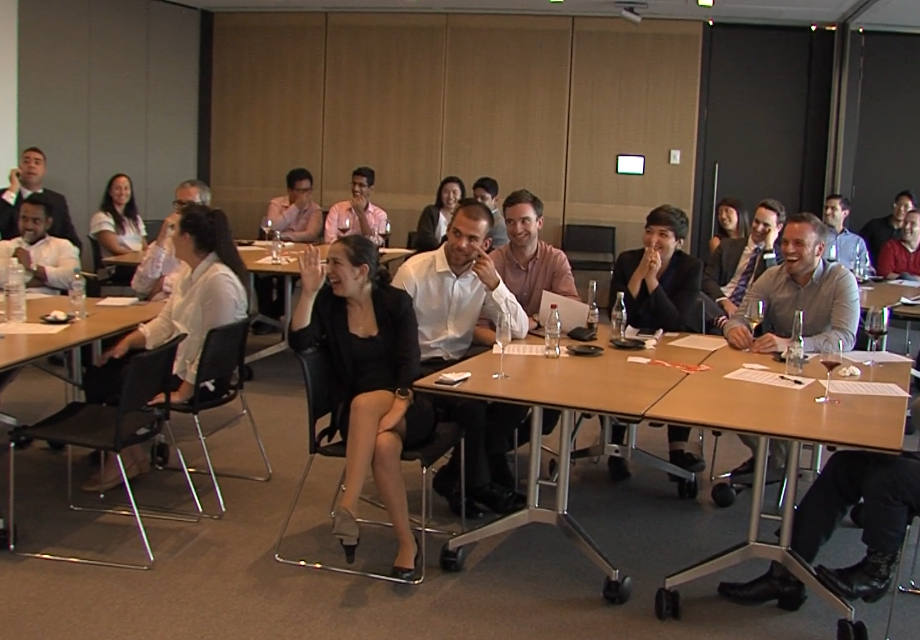
A change to traditional training: what to expect in Drama Based Training
If you have responsibility for organising learning events and team building training, you might find it difficult trying to arrange something suitable that mixes learning with fun. If you’re looking for an enjoyable, refreshing alternative to traditional training, Drama Based Training (DBT) could be for you.
Our blog post ‘What is Drama Based Training and 5 reasons why it can benefit your business’ will give you some background knowledge to all things DBT. In this post we’re going to guide your through step by step what happens in a DBT session. As well as give feedback on what staff enjoy about it.
What does Drama Based Training involve?
You may be pleasantly surprised to learn that DBT doesn’t involve you having to take part in awkward role play (we have actors to do that!).
Gibber employ tried and tested drama techniques that inform and inspire staff to combine best practice into everyday procedures. This encompasses a fun dynamic start to the session, syndicate exercises, facilitated discussion, scripted scenarios, forum theatre and practice.
Fun Dynamic Start
A short sharp dynamic, funny scripted scenario to leave the participants in no doubt that the training workshop is going to be something a little bit different.
Facilitated discussion and syndicate exercises
A facilitated discussion ensuring an effective training environment where staff are challenged to move out of their comfort zone and assimilate identified learning objectives into their everyday practice.
Scripted Scenarios
Actor/facilitators present scripted scenarios with a focus on your organisations key objectives to challenge perceptions, demonstrate identified issues, best/worst practice, and stimulate debate around responsibilities, policy and procedures.
Forum Theatre
Using the improvisational expertise of our actor/facilitator’s, staff are encouraged to direct each scenario presented, generating ideas that will impact upon outcomes of the scenario. Working in this way enables us to stop, start, fast-forward, rewind or simply start again to explore safeguarding responsibilities and procedures. The section concludes with a discussion, sharing expertise and experience that will reflect upon worst/best practice.
Practice
Using actor/facilitators in small groups to facilitate ‘practice’ and challenge staff. These interactive experiential drama techniques offer the opportunity for staff to experience the impact of attitudes, behaviours and procedures in the workplace and observe the consequences of actions on employees without repercussions.
Fun Dynamic End
The training workshop closes with a fun, tongue in cheek parody of what would happen if procedures weren’t followed and it all went horribly wrong. Concluding with a facilitated summary highlighting key learning outcomes leaving staff motivated, inspired and ready for action.
What do employees say about DBT?
Feedback from employees who participate in Drama Based Training is that it is a good example of how you can mix both fun and learning.
They say it’s a great way to engage a crowd. It helps people to understand the key things you’re trying to get across. As well as retain the message, because you’re involved in the learning.
Staff comment that they like being shown a scenario by the actors and then being able to talk through the scenario, question what was wrong with it, discuss ideas about how you could change it, then rewind and rework it to give a different outcome.
Another notable benefit that staff do not expect from DBT is how engaging and eye opening it is to see situations from a third-party perspective. Having the actors act out real situations with elements that they see every day in their jobs allows staff to be reflective and consider the best approach to a scenario. Often when in the moment this is something you don’t normally have the time to consider.
Senior leaders say that Drama Based Training could be used in different ways with all levels of staff from juniors up to executives. With sessions covering similar principals but being moulded to suit the target audience.
Would you like a unique approach to your training that’s educational, lots of fun and brings people together? As well as, provokes questions that wouldn’t usually come out of a standard training session, then please contact Gibber (UK) hello@wearegibber.com (AUS) gday@wearegibber.com.
You might also like to read about some organisations who have had success from Drama Based Training.

Recent Comments